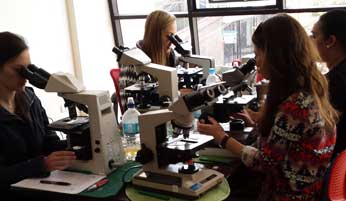 The students, along with Professor Barbara Klitz and Education Coordinator Nadia Saadeh, worked with local health care provider CerviCusco to screen Pap smears collected from women in rural communities in the Andes Mountains.
The students, along with Professor Barbara Klitz and Education Coordinator Nadia Saadeh, worked with local health care provider CerviCusco to screen Pap smears collected from women in rural communities in the Andes Mountains.
“In the U.S.A., because of the Pap smear, women rarely die from cervical cancer,” said Klitz. “But in Peru, it is still the number one killer of women.”
While in Peru, the students, fresh from passing their board of certification exam, received their first experience providing diagnoses to patients. They examined samples of cervical cells through a microscope and analyzed them for signs of cervical cancer and pre-cancerous lesions.
“This class and the trip to Peru were one of the reasons why I was drawn to URI’s cytopathology program,” said Alexandra Bogardus of Manchester, N.H. “I was interested in cytopathology because I wanted to help people, and this trip gave us an opportunity to do exactly that. It was a truly gratifying experience to volunteer our time to help people who wouldn’t get this kind of medical care otherwise.”
The experience wasn’t without its challenges, however. The laboratory had only one donated computer, a processing machine that often broke down, and no system for organizing patient files, so the students often found themselves spending hours searching for a patient’s record. Public transportation workers in Peru were also on strike during their visit, making it difficult to get to the lab. Yet they persevered.
“It was a great experience getting to meet the people and learn how different their culture is,” said Taylor Choquette of Warwick. “Being able to hear stories about different women fighting cancer and then be able to help them and others prevent cervical cancer was incredible.”
When the students returned home, they were required to develop a cervical cancer prevention program for another country. Bogardus chose Ethiopia, where cervical cancer is the leading cause of cancer death in women, and Choquette selected Zambia.
“Zambia has the second highest rate of cervical cancer in the world,” Choquette said. “It’s a country where there is only one doctor for every 23,000 people, while the World Health Organization recommends there be at least one doctor or nurse for every 7,000 people. Zambians are aware of the issue, but their primary focus is on general health rather than cervical cancer.”
Both students agree that the lessons they learned in Peru will help them significantly in their future careers. They also now have a greater appreciation for the health care available here in the United States.
“I learned that here we take a lot of things for granted, and that if it wasn’t for volunteers going down to help this clinic out, there would be no clinic,” said Choquette. “From this experience, I now want to go to different clinics all over the world to help other women.”
Added Bogardus, “This experience taught me to be grateful for what I have, and the blessings that God has given me, most of which I’ve lived my whole life without realizing I should be thankful for them.”
The other URI students participating in the trip were Jennifer Delacruz of East Providence, Brittaney Korpacz of West Greenwich, Robert Siravo of Cranston and Angela Williams of Pawtucket.
Pictured above
URI graduate students Alexandra Bogardus, Taylor Choquette, Angela Williams and Jennifer Delacruz screen Pap smears for signs of cervical cancer during a medical mission to Peru in August. (Photo courtesy of Barbara Klitz)

